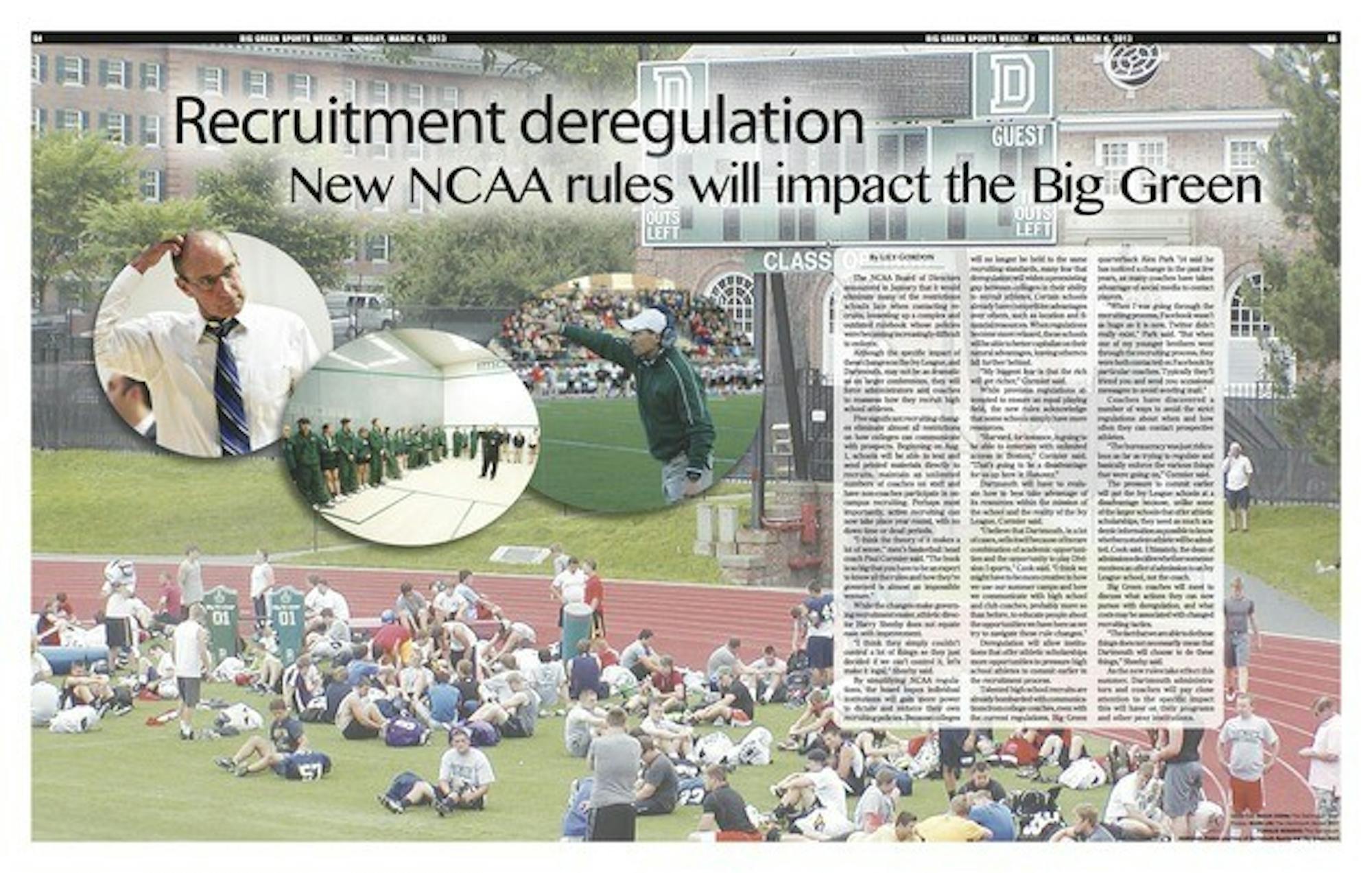Although the specific impact of these changes on the Ivy League, and Dartmouth, may not be as dramatic as on larger conferences, they will force administrators and coaches to reassess how they recruit high school athletes.
Five significant recruiting changes eliminate almost all restrictions on how colleges can communicate with prospects. Beginning on Aug. 1, schools will be able to text and send printed materials directly to recruits, maintain an unlimited numbers of coaches on staff and have non-coaches participate in on-campus recruiting. Perhaps most importantly, active recruiting can now take place year round, with no down time or dead periods.
"I think the theory of it makes a lot of sense," men's basketball head coach Paul Cormier said. "The book is so big that you have to be an expert to know all the rules and how they're governed is almost an impossible venture."
While the changes make governing recruitment easier, athletic director Harry Sheehy does not equate ease with improvement.
"I think they simply couldn't control a lot of things so they just decided if we can't control it, let's make it legal," Sheehy said.
By simplifying NCAA regulations, the board hopes individual institutions will gain more power to dictate and enforce their own recruiting policies. Because colleges will no longer be held to the same recruiting standards, many fear that deregulation will widen a preexisting gap between colleges in their ability to recruit athletes. Certain schools already have competitive advantages over others, such as location and financial resources. When regulations become more relaxed, these schools will be able to better capitalize on their natural advantages, leaving others to fall further behind.
"My biggest fear is that the rich will get richer," Cormier said.
While previous regulations attempted to ensure an equal playing field, the new rules acknowledge that some schools simply have more resources.
"Harvard, for instance, is going to be able to entertain with unlimited access in Boston," Cormier said. "That's going to be a disadvantage for us up here in Hanover."
Dartmouth will have to evaluate how to best take advantage of its resources within the mission of the school and the reality of the Ivy League, Cormier said.
"I believe that Dartmouth, in a lot of cases, sells itself because of its rare combination of academic opportunities and the opportunity to play Division I sports," Cook said. "I think we might have to be more creative in how we use our summer camps and how we communicate with high school and club coaches, probably more so than before, to educate people about the opportunities we have here as we try to navigate these rule changes."
Deregulation will allow institutions that offer athletic scholarships more opportunities to pressure high school athletes to commit earlier in the recruitment process.
Talented high school recruits are already bombarded with communications from college coaches, even with the current regulations. Big Green quarterback Alex Park '14 said he has noticed a change in the past few years, as many coaches have taken advantage of social media to contact players.
"When I was going through the recruiting process, Facebook wasn't as huge as it is now, Twitter didn't really exist," Park said. "But when one of my younger brothers went through the recruiting process, they were both contacted on Facebook by particular coaches. Typically they'll friend you and send you occasional messages to avoid sending mail."
Coaches have discovered a number of ways to avoid the strict regulations about when and how often they can contact prospective athletes.
"The bureaucracy was just ridiculous as far as trying to regulate and basically enforce the various things that were going on," Cormier said.
The pressure to commit earlier will put the Ivy League schools at a disadvantage because, unlike some of the larger schools that offer athletic scholarships, they need as much academic information as possible to know whether a student-athlete will be admitted, Cook said. Ultimately, the dean of admissions decides whether someone receives an offer of admission to an Ivy League school, not the coach.
Big Green coaches will meet to discuss what actions they can now pursue with deregulation, and what costs may be associated with changed recruiting tactics.
"The fact that we are able to do these things does not necessarily mean that Dartmouth will choose to do these things," Sheehy said.
As the new rules take effect this summer, Dartmouth administrators and coaches will pay close attention to the specific impact this will have on their programs and other peer institutions.




